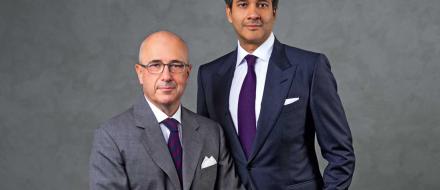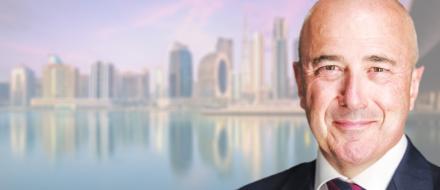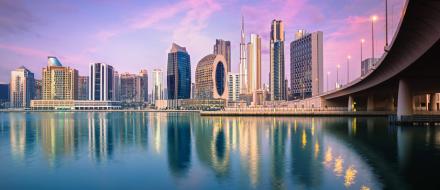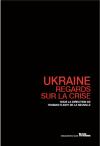Megacity of Eurasia
Even the present geopolitical crisis does not deprive the russian capital of the prospect of becoming one of the world's main commercial centres.
In November 2013, at the World Economic Forum (WEF) in Abu Dhabi, the Global Agenda Council, dealing with the future of governments, considered three possible scenarios for the future global political system, the first of which focused on megacities. Moscow is not an exception. It should become Eurasia’s megacity, which is not a matter of glory, but rather of necessity.
The increase in globalisation rates requires concerted action in the field of macroeconomic policies at the level of large regional blocs. But is there a man — a young, talented, financially secure man — who will endure air pollution, endless traffic jams and excessive bureaucracy? The main task for Moscow comes down to solving these problems. On the one hand, Russia, Ukraine, India, Caucasus and Central Asia need an effective regional and international centre outside the Western influence. On the other hand, to use this unique opportunity, Russia will have to overcome a number of difficulties.
The increase in globalisation rates requires concerted action in the field of macroeconomic policies at the level of large regional blocs.
In contrast to the numerous reform periods, such as in the time of Alexander II, Moscow doesn’t need to rely solely on Western countries. Without forgetting them, Moscow may draw (without conquering or controlling) from the talents and resources of neighbouring countries, particularly from former Soviet republics, especially the Asian ones.
Moscow started competing with other global cities rather late, but quite possibly may become Eurasia’s global city — it has a number of apparent advantages and is ready to make every effort to achieve the goal. In terms of GDP, Moscow ranks 15th in the world: in 2012 the index value reached $357bn, and is expected to increase by 2.3% -3% in 2014-2016. Despite the fact that the city is still home to several polluting industries as the authorities seek to preserve its industrial potential, Moscow is a pretty typical post-industrial city with a growing economy. The growth is primarily provided by the scope of services and the city’s basic function as a communication node. Like other megacities, Moscow is more diversified than most industrial cities, and as a consequence, less affected by sharp fluctuations in the performance of individual sectors of the economy. Innovations are born here, supported by research and development. The city’s budget is $60bn (third in the world), and the ratio of debt to GDP does not exceed 1.7%. The population is 12 million people, the average income per capita is $20,000 per year, 42% of residents have a college degree. More than 1.2 million young Russians and citizens of neighbouring countries are studying in Moscow. Finally, let’s not leave out the attractiveness of Russia’s tax system: the flat rate of income tax for individuals (regardless of the level of declared income) is 13%, and the tax rate on profits is only 20% (and even less for investment projects).
Innovations are born here, supported by research and development.
In order to ensure Moscow’s status as an internationally recognised megacity, Sergey Sobyanin, the city’s new Mayor, has directed his main efforts towards focusing on a number of priorities, in particular the development of education, healthcare and science (including technology parks). The investment capacity in these spheres is increasing, especially in the eight special economic zones. The number of public-private partnerships is growing. The fact that the budget for these infrastructures reaches eight billion shouldn’t come as a surprise. In the Soviet era, it took years before one could afford to buy a car. In modern Russia, people are feverishly impatient to buy cars in an attempt to improve their social status in a society addicted to hierarchy. This, however, led to a sharp increase in the number of cars on the roads, which went hand-in-hand with environmental degradation and, in turn, stimulated the improvement of the public transportation system and the rise in the number of passengers amongst 300 million people in 2013 as compared to 2010. And yet, one can experience how traffic jams literally paralyse the city, at times for several hours. Holding several meetings during the day, even if they are all in the centre, is a pipe dream, the naive hope of a foreign guest, that causes a sad smile on a Muscovite’s face.
Yet, in some international rankings, Moscow ranks high: Fourth place in the world in terms of foreign direct investment in new projects ($4.2 billion in 2012, up 5.9 % as compared to 2011), seventh based on the number of large companies; ninth among the most promising cities. However, a more general indicator, the assessment of business environment (Doing Business), leaves much to be desired, rating Moscow catastrophically low at 118th place worldwide in 2012. The problem of Moscow’s (and Russia’s) image in the eyes of the international community needs to be addressed on the national level. According to the December rankings of the non-governmental organisation Transparency International, Russia ranks 127th, after Albania, Algeria and some other notoriously corrupt countries in Africa and Asia.
Yes, Russia has a high level of corruption, but (and I say this as a foreign entrepreneur who has been working in Russia for over 20 years now), I resent this offensive, overly-negative evaluation. Nevertheless, the rating is published and replicated and, unfortunately, serves as a benchmark for many companies. This is a good example of the West’s soft power policy in action. I keep telling my Western European counterparts that although the situation in Russia can’t be called simple, there are countries with lower levels of corruption (for it is everywhere), where it is much harder to do business. Running the project requires learning hundreds of laws and regulations. Sometimes the tax system stifles any initiative on the vine. Examples are not far to seek. Russians sometimes find that the grass is greener on the other side. They should really recall Talleyrand’s remark: “When I peer at myself, I feel sad; when I compare myself with others, I calm down”. By the way, even the head of the World Bank Jim Yong Kim, said: “I have visited many countries, but nowhere, except Russia, especially in Moscow, have I seen such clear desire to improve the business environment”.
The rating is published and replicated and, unfortunately, serves as a benchmark for many companies. This is a good example of the west's soft power policy.
Moscow might want to follow the example set by China, Singapore or the United Arab Emirates, which are distinguished by a combination of a liberal economic system and authoritarian governance. The success of this model is so obvious today that it may cast doubt on the effectiveness of “Western democracies”, which have ruled the world for three centuries. As for the long-term perspective, once a society reaches a certain level of development, particularly at the end of the middle class period, there is a need for system transparency and openness. If these are absent, a period of decline begins. At this important moment, Russia and Moscow should make every effort to choose the right path.
The official website of the Moscow administration presents the main factors of the city’s well-being: a significant potential for economic development, stable national currency, efficient financial system, liberal economic legislation. The situation is not unfavourable, by all indications. Despite the low rates of economic growth in Russia in 2013 (2.5%), indicators remain generally positive, with an average of 7% in 2003-2008 and 2.5%-4% over the last three years (excluding the 2009 crisis). The Dollar and Euro fluctuated during the crisis, caused by the excessive volume of subprime lending in the U.S. However, the Russian rouble has remained relatively stable. Subsequently, as in other countries, the State has taken an active part in assisting the affected banks. And yet, in order to achieve the desired result, Moscow should not just declare its readiness to develop infrastructure construction, but also clearly demonstrate it. The most important thing at the moment is to ensure the credibility of the system as a whole.
In order to achieve the desired result, Moscow should not just declare its readiness to develop infrastructure construction, but also clearly demonstrate it.
The Warsaw Stock Exchange’s positive experience should inspire Moscow’s authorities, and, focusing on the more distant future, the success of Dubai, as the model of which I, as an expert in the banking sector, have been looking for the last two years. Free economic zones and the Dubai International Financial Centre (DIFC) may be of some interest to Moscow. Dubai has made significant strides in its desire to become an international financial centre: avoiding the restrictions of local laws, especially of Shariah, DIFC has prepared an independent regulatory framework, in many ways similar to the British one. Dubai successfully demonstrates the ability to implement fundamental changes and use them to draw attention to the city. Moscow is not quite ready for such radical changes and such active self-promotion, but it can only achieve this goal (although it has the necessary funds) by improving its image and quality of life, which is achievable through active work on the so-called “soft factors”. It is also necessary for Russia and its capital to pay attention to the ideas which are popular in the business community, in particular, the concept of customer service, as working on this aspect can bring incredible results. Dubai, a global megacity, where not-so-liberal views are upheld, but where harmony prevails, knows how to provide a warm welcome, starting with its airline, which no longer needs to rely on advertising, highlighting the broad range of destinations, especially in developing countries, the fact that the planes are equipped with the latest technology, and that the quality of service is at the highest level. Impressions from Dubai Airport and Sheremetyevo are as different as heaven and earth. Nothing prevents Russia from creating the world’s best airline and turning Moscow into Eurasia’s transportation hub. Nothing is impossible. Take a look at the progress in quality of service made in such service areas as hospitality over the past 10 years. The authorities proved their willingness to work on the city’s development, and yet … It is a lot like opening a new restaurant: the construction is complete, the design meets the latest fashion trends, the cutlery is laid out on the tables in anticipation of new guests, the new chef has just started working. Everything is up to par, but going to a restaurant and having dinner there is just not quite enough to make people want to return. A congenial atmosphere is needed. Many have succeeded in this. Moscow and Russia may well achieve the same result and even surpass it.
Has Moscow’s future as one of the major cities in the world dropped dead because of the geopolitical crisis in Crimea and Ukraine? Indeed, the shine of the Third Rome of the north has faded very substantially. Encouraging an inflation of bad sentiment, some media and politicians from both sides have revived expressions of the Cold War, and even worse, of the Second World War. It will surely take some time before the image of Moscow recovers, if it ever does. One should be careful with the new Cassandra prophets who keep on predicting a terrible future for Russia. Let us recall the August 17th 1998 default: the whole planet of so-called experts, and especially the Western countries of Europe and America, announced that Russia had basically no future, it will take decades to recover, no investor will ever come back, etc. Just two years later, the situation started to improve, and growth led the way until the financial crisis of 2008.
The current situation is certainly negative for Moscow, but one should always take the long-term view.
In other words, the current situation is certainly negative for Moscow, but one should always take the long-term view. Markets and business are usually short-sighted, and will come back if and when there are some favourable conditions and a decent prospect for the next new few years. Additionally, a crisis is always a time for new opportunities as long as one looks at it from a different perspective.
Arnaud Leclercq
Article published on the website bigrussia.org













